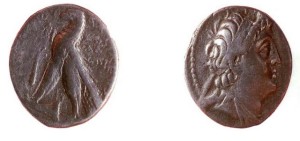250 B.C.E. Septuagint
 Hebrew Bible Text Translated into Greek
Hebrew Bible Text Translated into Greek
Who had decided to translate the Torah into Greek, and why was the decision taken? Two doctrines are currently professed. The first being a royal among the proponents of a royal initiative. This thesis is founded on a Jewish legend, later adopted by the Christians, first attested in the Letter of Aristeas to Philocrates and by the philosopher Aristoboulos, who attributed the initiative of the translation to King Ptolemy II Philadelphus.
Let us hear, firstly, the testimony of the Letter. The king had allotted a sizable sum of money to Demetrius of Phalerum, now the chief librarian of the Alexandrian Library, to enable him to assemble all the important works of universal literature. The librarian had heard about the laws of the Jews, which surely were worthy of transcription and a place in the royal library. “What are you waiting for to do it, since you have the wherewithal?” asks Ptolemy. “But they have to be translated,” replies the librarian, and acquaints his sovereign with the particularities of the Hebrew language and its script, stressing the obstacles to be overcome before a reader could gain access to the texts.
No matter! The king decided that a letter was to be sent to the high priest in Jerusalem and ordered the librarian to prepare a report on the project. Eleazar, the high priest in office, was cooperative, and forthwith dispatched seventy-two translators to Alexandria, so that each of the twelve traditional tribes was represented by six persons. He chose the most competent scholars, both highly expert in Hebrew letters and steeped in Greek culture. Upon their arrival in Alexandria, a great banquet was offered them, “in conformity with their customs” (a kosher meal?); by royal decree, the feast was prolonged for an entire week. The king bombarded his guests with questions, receiving in return a string of edifying counsels amounting to a veritable treatise on the difficult business of kingship (peri basileias). Now, the real work could begin.
Letter of Aristeas to Philocrates, 301-11
“Demetrius, who had come to meet the translators, led them across the pier which was seven stadia long that led to the Island of Pharus, passed over the bridge, moved to the north, assembled them in a place that had been prepared for them near the beach, a magnificent dwelling surrounded by silence, and invited them to proceed with the work of translation, all the wherewithal being supplied. They set to work and agreed on each point by mutual discussion and confrontation. From the resulting text, Demetrius had a copy made up in due form. Until the ninth hour they held session, after which they were free to tend to their corporal needs, and all that was necessary for this was provided for them. Moreover, each day, all the morsels that had been prepared for the king, Dorotheos [the courtier who had the translators in his charge] had them prepared for them also, for the king had so ordained.
At the break of day, they came to the court every day, and when they had greeted the king, they retired to their individual dwelling. After having washed their hands in the sea, according to the custom of all Jews, they set themselves to the task of reading and translating each passage. Every day, they gathered in the place that was so agreeable by its tranquility and its light, and they carried out the work prescribed for them. Now, it came about that the work of translation was done in seventy-two days, as though such a thing had been due to a premeditated decision.
When the work was done, Demetrius assembled the community of the Jews on the spot where the work of translation had been accomplished, and he had it read to the entire congregation, in the presence of the translators who, moreover, were acclaimed by the people with enthusiasm, for their considerable contribution to such a good work. They gave Demetrius a similar ovation and asked him to send their leaders a copy of the entire law. After the reading of the scrolls the priests, standing, the elders of the translators and the delegates of the community (politeuma), as well as the leaders of the people, made this declaration: “Now that the translation has been so well done, with piety and with rigorous exactitude, it is well that this work stay as it is, without the slightest alteration.” At these words, there was a general acclamation; then they asked them to pronounce an anathema, according to their custom, against anyone who altered the letter of the text, either by prolonging it or by changing it in any manner whatsoever, or else by cutting out a part of it: an excellent measure to keep it forever immutable.
Source: Joseph Mélèze Modrzejewski. The Jews of Egypt. (p. 100-102)
See also:



